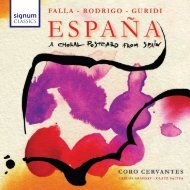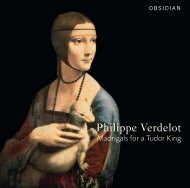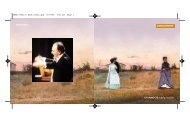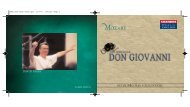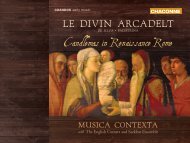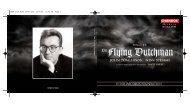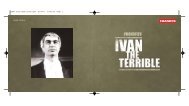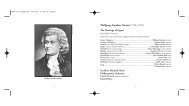You also want an ePaper? Increase the reach of your titles
YUMPU automatically turns print PDFs into web optimized ePapers that Google loves.
phrasing. but he must definitely observe every one<br />
of the long rests. The rests add to the grandew of<br />
the prophet's line. which would be completely<br />
ruined by hunying. The architecture of the phrase<br />
is strengthened by placing the chords on the beats,<br />
but this is not always done. The final two chords<br />
must be on the second and third beats to avoid a<br />
dissonance that Handel certainly did not intend.<br />
The tempo of the aria "Every valley" is twice<br />
as tast as that of the rccitative. This enables the<br />
singer to handle the runs in one phrase, as Handel<br />
obviously intended. It also gives the aria the<br />
necessary elastic lightness.<br />
In the short recitative "Behold! A virgin shall<br />
conceive", Kathleen Fenier's voice still rings<br />
vividly in my ear from our Messia& performances<br />
in Liverpool in 1945. She sang it with all the<br />
etl'ective rests, thus obtaining the strong feeling of<br />
"God with us".<br />
Aksel Schiotz on Dowland:<br />
England in the sixteenth, seventeenth, and<br />
eighteenth centuries produced great song<br />
composers. John Dowland and the other<br />
Elizabethan composers wrote their songs mostly to<br />
lute accompaniment. Dowland himself was one of<br />
the most acomplished lute virtuosi who ever lived.<br />
With their complicated rhythms and great technical<br />
demands, these songs present a challenge to the<br />
singer of today.<br />
Also, their musical value and emotional<br />
impact have such a stimulating effect on both<br />
performer and listener that they re an exciting<br />
asset to every singer's repertoire. Even if they lose<br />
something in being accompanied by harpsichord<br />
(on the lute stop), some of these old songs sparkle<br />
like precious stones. "I Saw My Lady Weep,"<br />
"Flow My Teas," "Fine Knacks for Ladies," "Shall<br />
I Sue," and "Come Again" ile some of Dowland's<br />
best known songs.<br />
(John Dowland was in the service of King<br />
Christian IV 1598-1606. Dowland's "Songs or<br />
Ayres for the Lute", 1597, 1600, 1603. were in part<br />
composed at Elsinore.)<br />
Aksel Schi6tz on Egisto Tango<br />
Gerd Schiotz:<br />
Aksel allowed himself to be really extravagant in<br />
the autumn of 1942, an extravaganza that made<br />
him as happy as an eighten year old receiving a car<br />
for a birthday present - and costing him about as<br />
muchl He hired the Royal Orchestra with maestro<br />
Egisto Tango, and Edith Oldrup, the soprano.<br />
booked our linest concert hall, and invited to a<br />
Mozat-Carl Nielsen concert. It was one of the<br />
biggest days in his life...<br />
Aksel Schiotz:<br />
When my debut as Fenando in "Cosi fan tutte" had<br />
been decided, Egisto Tango gave me every possible<br />
help. I could not have been in better hands. It is an<br />
enormous support for an inexperienced singer to<br />
have a conductor in the dark pit who musically is<br />
holding your hand.<br />
During the Mozarl week in 1941 when the<br />
composer was celebrated in many ways, there was<br />
a concert perfbmance of "Don Giovanni" in which<br />
I sang Don Ottavio together with singers from the<br />
Royal Opera. The rehearsals were sheer delight for<br />
me. I was reminded of the advice once given me by<br />
Tango: "You must try to get in touch with a great<br />
musician. He can teach you more than the best of



